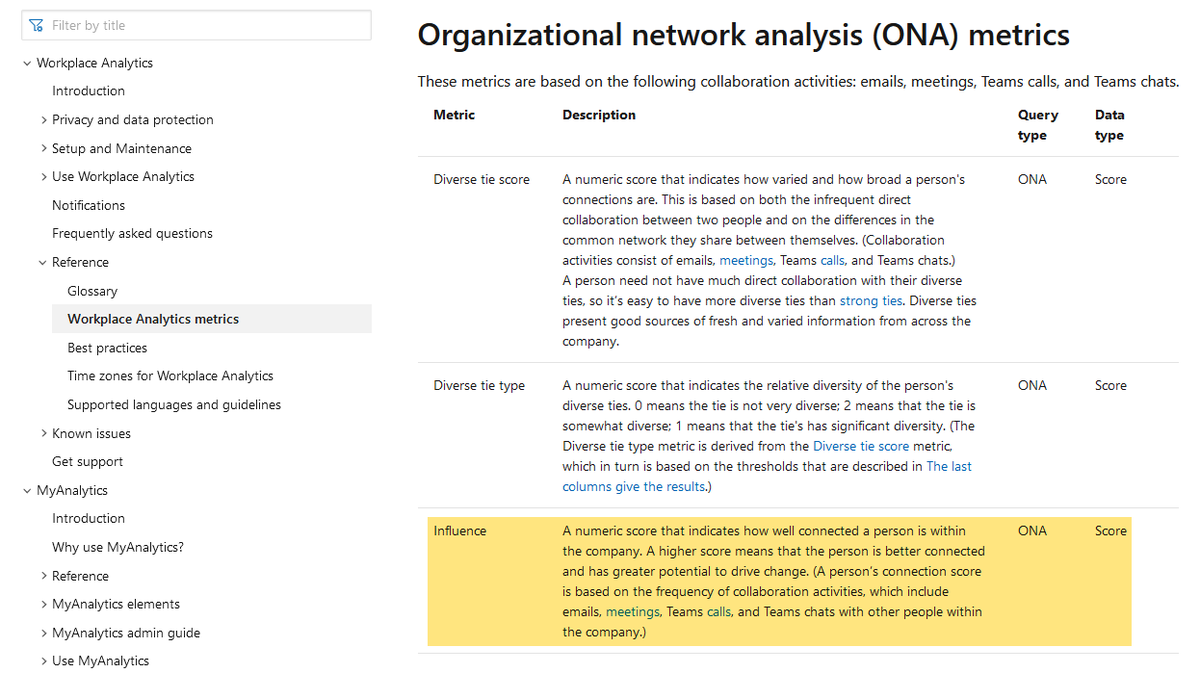Esoteric metrics based on analyzing extensive data about employee activities has been mostly the domain of fringe software vendors. Now it& #39;s built into MS 365.
A new feature to calculate & #39;productivity scores& #39; turns Microsoft 365 into an full-fledged workplace surveillance tool:
A new feature to calculate & #39;productivity scores& #39; turns Microsoft 365 into an full-fledged workplace surveillance tool:
Employers/managers can analyze employee activities at the individual level (!), for example, the number of days an employee has been sending emails, using the chat, using & #39;mentions& #39; in emails etc.
Microsoft promo video:
https://www.youtube.com/watch?v=-8te3OmHnlg
Via">https://www.youtube.com/watch... Heise:
https://www.heise.de/news/Anwenderueberwachung-durch-Microsofts-Office-Software-4968615.html">https://www.heise.de/news/Anwe...
Microsoft promo video:
https://www.youtube.com/watch?v=-8te3OmHnlg
Via">https://www.youtube.com/watch... Heise:
https://www.heise.de/news/Anwenderueberwachung-durch-Microsofts-Office-Software-4968615.html">https://www.heise.de/news/Anwe...
Showing data on individuals can be turned off, but it& #39;s activated *by default*. This normalizes extensive workplace surveillance in a way not seen before.
I don& #39;t think employers can legally use it in most EU countries. I& #39;m sure they cannot legally use it in Austria and Germany.
I don& #39;t think employers can legally use it in most EU countries. I& #39;m sure they cannot legally use it in Austria and Germany.
In addition, Microsoft lures companies into sharing employee data with Microsoft in order to show them how their numbers compare to the numbers of other organizations.
As a result, Microsoft gets access to a massive stack of employee data across many organizations.
As a result, Microsoft gets access to a massive stack of employee data across many organizations.
This is so problematic at many levels:
- Managers evaluating individual-level employee data is a no go
- Any evaluation of group & #39;productivity& #39; data can also shift power from employees to organizations
- Employee self control via MyAnalytics is the first step to normalization
- Managers evaluating individual-level employee data is a no go
- Any evaluation of group & #39;productivity& #39; data can also shift power from employees to organizations
- Employee self control via MyAnalytics is the first step to normalization
- Not least, Microsoft gets the power to define highly arbitrary metrics that will potentially affect the daily lives of millions of employees and even shape how organizations function
MS has been selling services that involve the analysis of data on employees for a few years.
In 2015, they introduced Delve, which & #39;map[s] the connections between people, content and interactions& #39; across Office 365 to provide personalized recommendations.
https://www.microsoft.com/en-us/microsoft-365/blog/2015/03/16/office-delve-discover-exactly-what-you-need-when-you-need-it/">https://www.microsoft.com/en-us/mic...
In 2015, they introduced Delve, which & #39;map[s] the connections between people, content and interactions& #39; across Office 365 to provide personalized recommendations.
https://www.microsoft.com/en-us/microsoft-365/blog/2015/03/16/office-delve-discover-exactly-what-you-need-when-you-need-it/">https://www.microsoft.com/en-us/mic...
Personalized recommendations and knowledge management, why not?
In the same year, MS also announced & #39;Delve Organizational Analytics& #39;, which did not just provide recommendations, but insights into behaviors and interactions to employees, and to managers.
https://venturebeat.com/2015/05/04/microsoft-previews-organizational-analytics-in-office-delve-coming-later-this-year/">https://venturebeat.com/2015/05/0...
In the same year, MS also announced & #39;Delve Organizational Analytics& #39;, which did not just provide recommendations, but insights into behaviors and interactions to employees, and to managers.
https://venturebeat.com/2015/05/04/microsoft-previews-organizational-analytics-in-office-delve-coming-later-this-year/">https://venturebeat.com/2015/05/0...
Subsequently, MS introduced MyAnalytics, a kind of & #39;self tracking& #39; dashboard for employees, and Workplace Analytics, its top-down counterpart for managers.
The latter provides all kinds of odd metrics based on extensive data.
https://techcommunity.microsoft.com/t5/workplace-analytics-myanalytics/bg-p/Office365AnalyticsBlog">https://techcommunity.microsoft.com/t5/workpl... https://docs.microsoft.com/en-us/workplace-analytics/use/metric-definitions">https://docs.microsoft.com/en-us/wor...
The latter provides all kinds of odd metrics based on extensive data.
https://techcommunity.microsoft.com/t5/workplace-analytics-myanalytics/bg-p/Office365AnalyticsBlog">https://techcommunity.microsoft.com/t5/workpl... https://docs.microsoft.com/en-us/workplace-analytics/use/metric-definitions">https://docs.microsoft.com/en-us/wor...
Everything is based on the so-called & #39;Microsoft Graph& #39; formed by & #39;hundreds of millions of users of Microsoft 365 cloud services& #39;, including data on & #39;social interactions& #39;.
Employers and others can use the & #39;people API& #39; to develop custom software:
https://docs.microsoft.com/en-us/graph/social-intel-concept-overview">https://docs.microsoft.com/en-us/gra...
Employers and others can use the & #39;people API& #39; to develop custom software:
https://docs.microsoft.com/en-us/graph/social-intel-concept-overview">https://docs.microsoft.com/en-us/gra...
"The people API returns data of a single entity, person, which includes typical data of an individual in today& #39;s business world"
"Relevance is noted in a relevance score of each person ... based on the user& #39;s communication and collaboration patterns and business relationships"
"Relevance is noted in a relevance score of each person ... based on the user& #39;s communication and collaboration patterns and business relationships"
From the Microsoft Graph API docs:
The & #39;activityStatistics& #39; object represents & #39;time spent by a user on various work activities during and outside of working hours, for the specified time range in the request& #39;, from calls to chats to email to calendar& #39;.
https://docs.microsoft.com/en-us/graph/api/resources/activitystatistics?view=graph-rest-beta">https://docs.microsoft.com/en-us/gra...
The & #39;activityStatistics& #39; object represents & #39;time spent by a user on various work activities during and outside of working hours, for the specified time range in the request& #39;, from calls to chats to email to calendar& #39;.
https://docs.microsoft.com/en-us/graph/api/resources/activitystatistics?view=graph-rest-beta">https://docs.microsoft.com/en-us/gra...
Or. The & #39;usedInsight& #39; object lists & #39;documents that a user has viewed or modified& #39;, including data from OneDrive and SharePoint.
Of course, this data is available. But in this case, it& #39;s part of & #39;people and workplace intelligence& #39;.
https://docs.microsoft.com/en-us/graph/api/resources/insights-used?view=graph-rest-beta
https://docs.microsoft.com/en-us/gra... href=" https://docs.microsoft.com/en-us/graph/api/insights-list-used?view=graph-rest-beta&tabs=http">https://docs.microsoft.com/en-us/gra...
Of course, this data is available. But in this case, it& #39;s part of & #39;people and workplace intelligence& #39;.
https://docs.microsoft.com/en-us/graph/api/resources/insights-used?view=graph-rest-beta
Employers are increasingly exploiting metadata logged by software and devices for performance analytics and algorithmic control.
MS is providing the tools for it. Practices we know from software development (and factories and call centers) are expanded to all white-collar work.
MS is providing the tools for it. Practices we know from software development (and factories and call centers) are expanded to all white-collar work.
Some reading stuff:
& #39;The datafication of the workplace& #39;, 2019
https://datajusticeproject.net/wp-content/uploads/sites/30/2019/05/Report-The-datafication-of-the-workplace.pdf
Data">https://datajusticeproject.net/wp-conten... & Society papers, 2019
https://datasociety.net/wp-content/uploads/2019/02/DS_Workplace_Monitoring_Surveillance_Explainer.pdf
https://datasociety.net/wp-conten... href=" https://datasociety.net/wp-content/uploads/2019/02/DS_Algorithmic_Management_Explainer.pdf
& #39;The">https://datasociety.net/wp-conten... Datafication of Employment& #39;, 2018
https://tcf.org/content/report/datafication-employment-surveillance-capitalism-shaping-workers-futures-without-knowledge/
& #39;Algorithms">https://tcf.org/content/r... at work& #39;, 2020
http://www.angelechristin.com/wp-content/uploads/2020/01/Algorithms-at-Work_Annals.pdf">https://www.angelechristin.com/wp-conten...
& #39;The datafication of the workplace& #39;, 2019
https://datajusticeproject.net/wp-content/uploads/sites/30/2019/05/Report-The-datafication-of-the-workplace.pdf
Data">https://datajusticeproject.net/wp-conten... & Society papers, 2019
https://datasociety.net/wp-content/uploads/2019/02/DS_Workplace_Monitoring_Surveillance_Explainer.pdf
& #39;The">https://datasociety.net/wp-conten... Datafication of Employment& #39;, 2018
https://tcf.org/content/report/datafication-employment-surveillance-capitalism-shaping-workers-futures-without-knowledge/
& #39;Algorithms">https://tcf.org/content/r... at work& #39;, 2020
http://www.angelechristin.com/wp-content/uploads/2020/01/Algorithms-at-Work_Annals.pdf">https://www.angelechristin.com/wp-conten...
Oh, and in Workplace Analytics, Microsoft assigns every employee an & #39;influence score& #39;, a & #39;numeric score that indicates how well connected a person is within the company& #39; based on extensive email, calendar, call and chat data.
https://docs.microsoft.com/en-us/workplace-analytics/use/metric-definitions">https://docs.microsoft.com/en-us/wor...
https://docs.microsoft.com/en-us/workplace-analytics/use/metric-definitions">https://docs.microsoft.com/en-us/wor...
Articles:
"Microsoft 365 is going full cop on employees with constant monitoring" https://www.inputmag.com/culture/microsoft-365-is-going-full-cop-on-employees-with-constant-monitoring
"Microsoft">https://www.inputmag.com/culture/m... tool lets employers watch staff and award & #39;productivity scores& #39; based on how many emails they send" https://www.independent.co.uk/life-style/gadgets-and-tech/microsoft-365-office-surveillance-productivity-b1761570.html
Best">https://www.independent.co.uk/life-styl... piece: https://newrepublic.com/article/160388/microsoft-productivity-score-workplace-analytics-employee-surveillance">https://newrepublic.com/article/1...
"Microsoft 365 is going full cop on employees with constant monitoring" https://www.inputmag.com/culture/microsoft-365-is-going-full-cop-on-employees-with-constant-monitoring
"Microsoft">https://www.inputmag.com/culture/m... tool lets employers watch staff and award & #39;productivity scores& #39; based on how many emails they send" https://www.independent.co.uk/life-style/gadgets-and-tech/microsoft-365-office-surveillance-productivity-b1761570.html
Best">https://www.independent.co.uk/life-styl... piece: https://newrepublic.com/article/160388/microsoft-productivity-score-workplace-analytics-employee-surveillance">https://newrepublic.com/article/1...
"With Productivity Score, Microsoft is joining a lucrative industry of startups selling worker tracking software ... There’s 73 pieces of granular data about worker behavior employers have access to, all associated with employees by name" https://www.forbes.com/sites/rachelsandler/2020/11/25/microsofts-new-productivity-score-lets-your-boss-monitor-how-often-you-use-email-and-attend-video-meetings/">https://www.forbes.com/sites/rac...
According to Forbes, Microsoft stated:
"We make all of these choices available to customers"
Translation:
"We are neither responsible for the tech we create and provide to tens of thousands of employers nor for the ways it may affect millions of workers"
"We make all of these choices available to customers"
Translation:
"We are neither responsible for the tech we create and provide to tens of thousands of employers nor for the ways it may affect millions of workers"

 Read on Twitter
Read on Twitter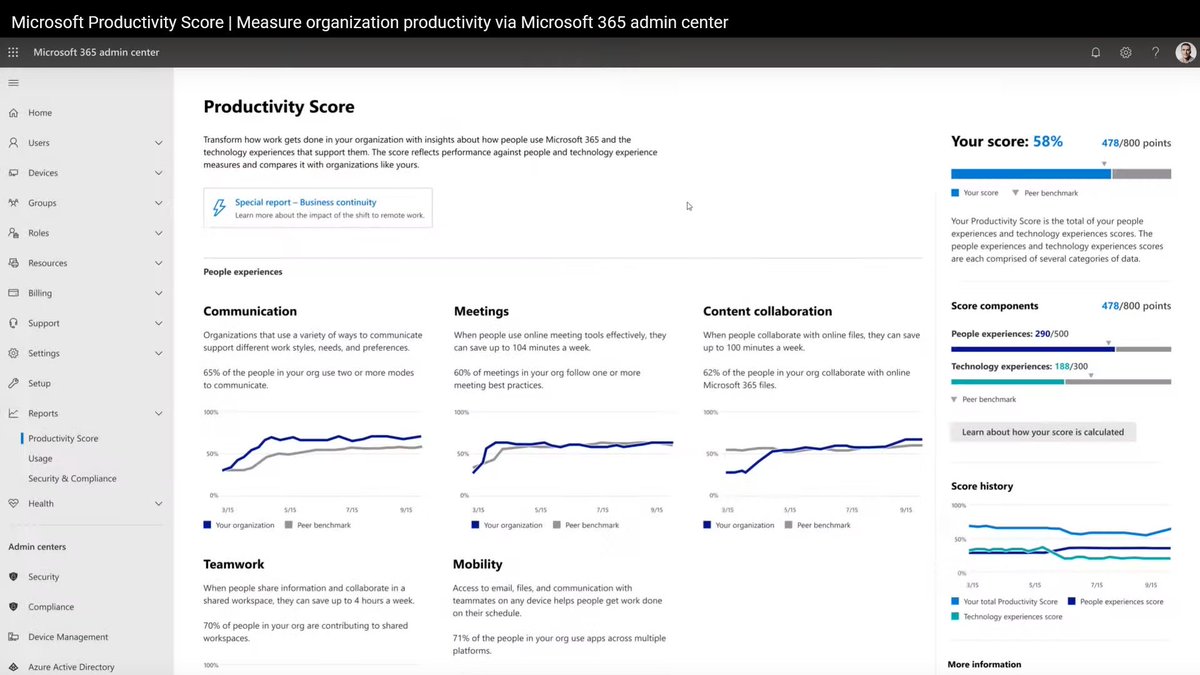

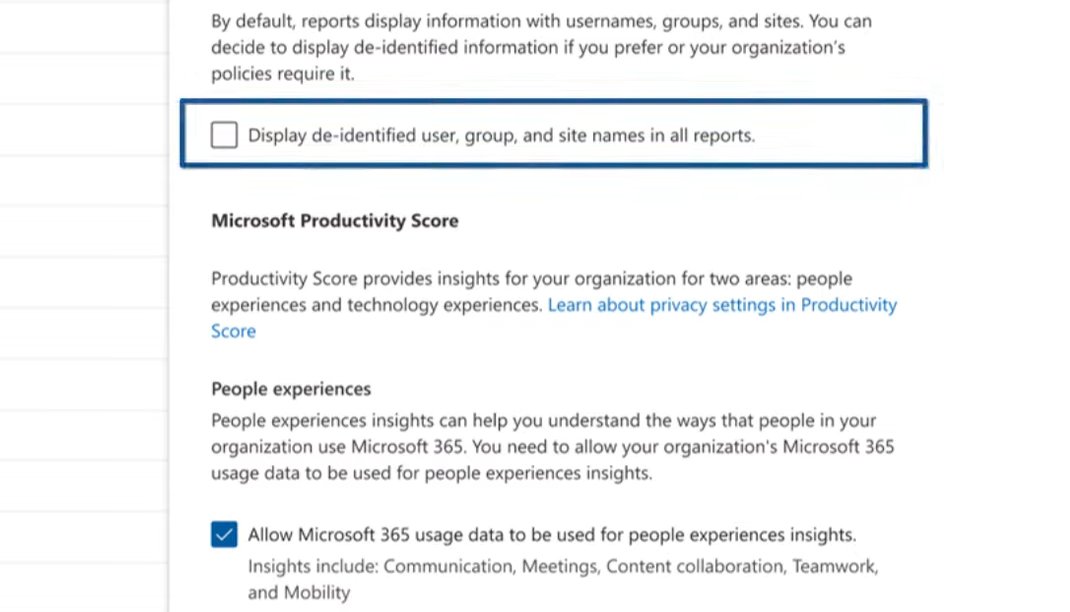
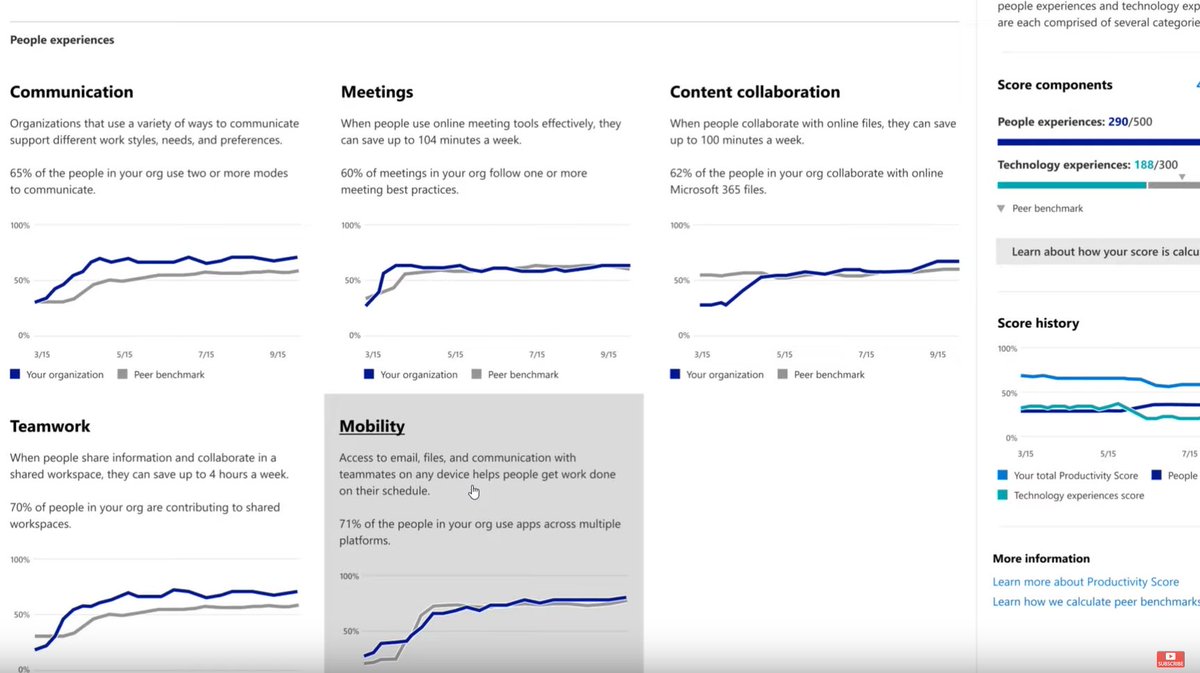
![MS has been selling services that involve the analysis of data on employees for a few years.In 2015, they introduced Delve, which & #39;map[s] the connections between people, content and interactions& #39; across Office 365 to provide personalized recommendations. https://www.microsoft.com/en-us/mic... MS has been selling services that involve the analysis of data on employees for a few years.In 2015, they introduced Delve, which & #39;map[s] the connections between people, content and interactions& #39; across Office 365 to provide personalized recommendations. https://www.microsoft.com/en-us/mic...](https://pbs.twimg.com/media/EnnuQrhWEAItiBc.png)

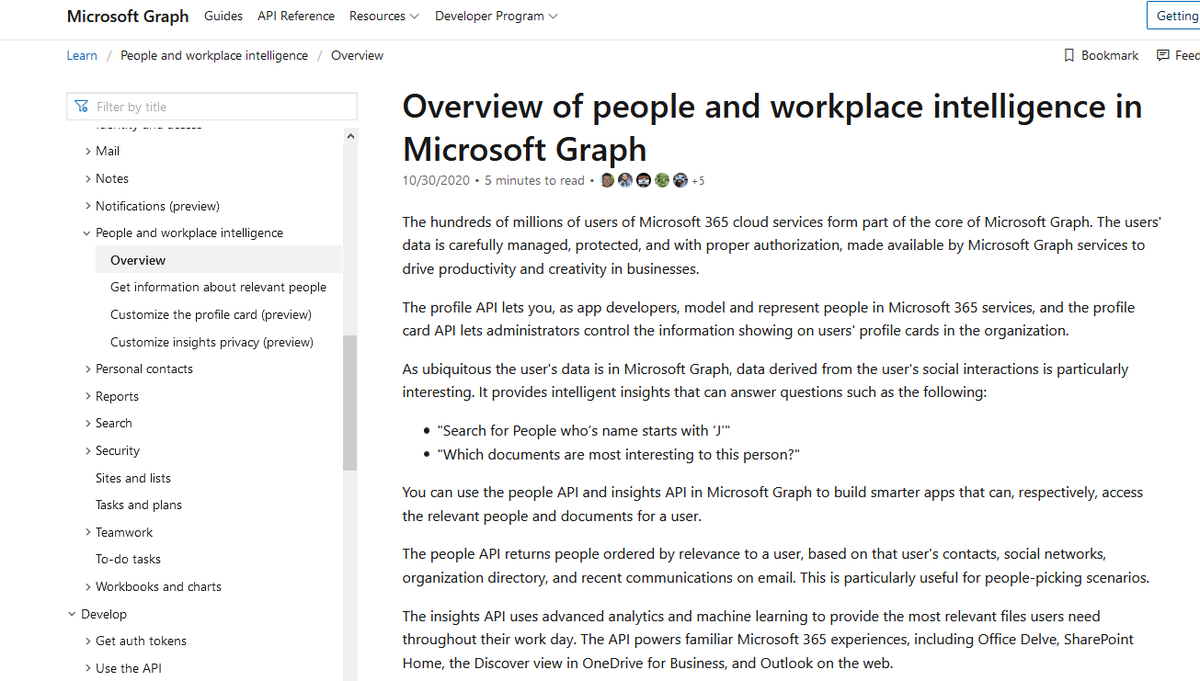
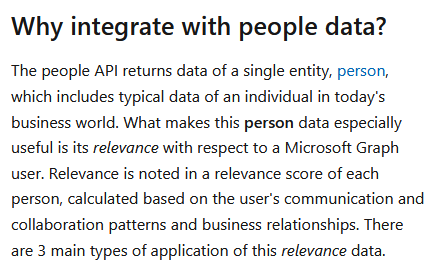

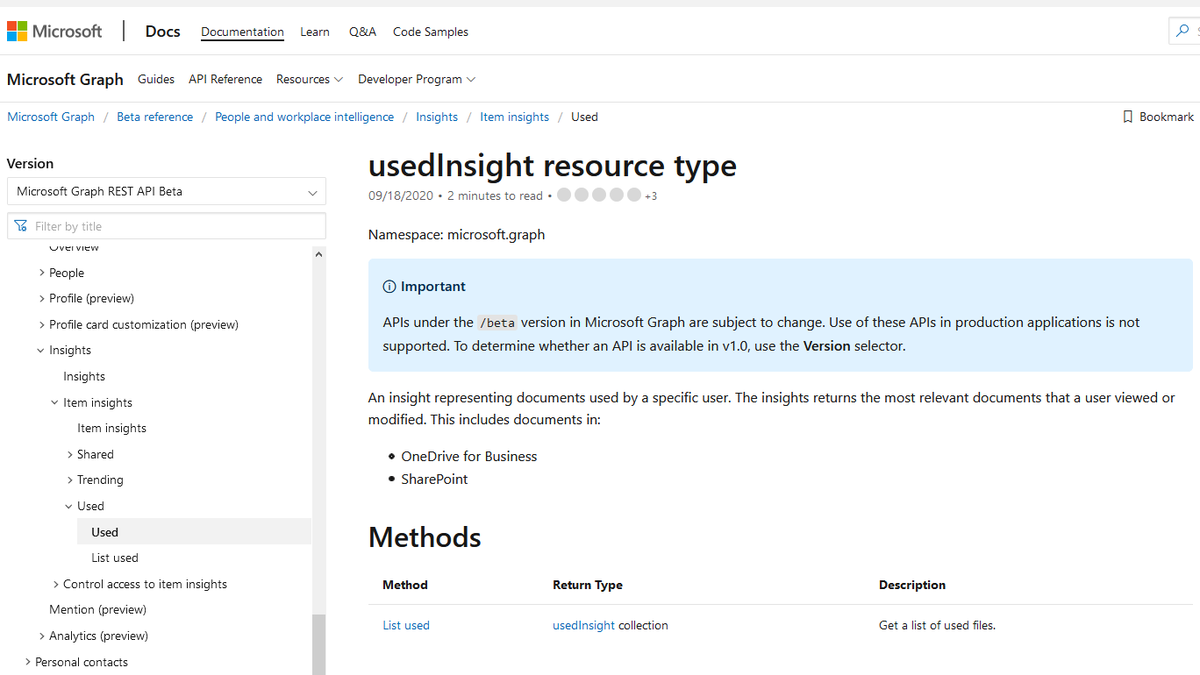 https://docs.microsoft.com/en-us/gra..." title="Or. The & #39;usedInsight& #39; object lists & #39;documents that a user has viewed or modified& #39;, including data from OneDrive and SharePoint.Of course, this data is available. But in this case, it& #39;s part of & #39;people and workplace intelligence& #39;. https://docs.microsoft.com/en-us/gra... href=" https://docs.microsoft.com/en-us/graph/api/insights-list-used?view=graph-rest-beta&tabs=http">https://docs.microsoft.com/en-us/gra..." class="img-responsive" style="max-width:100%;"/>
https://docs.microsoft.com/en-us/gra..." title="Or. The & #39;usedInsight& #39; object lists & #39;documents that a user has viewed or modified& #39;, including data from OneDrive and SharePoint.Of course, this data is available. But in this case, it& #39;s part of & #39;people and workplace intelligence& #39;. https://docs.microsoft.com/en-us/gra... href=" https://docs.microsoft.com/en-us/graph/api/insights-list-used?view=graph-rest-beta&tabs=http">https://docs.microsoft.com/en-us/gra..." class="img-responsive" style="max-width:100%;"/>
